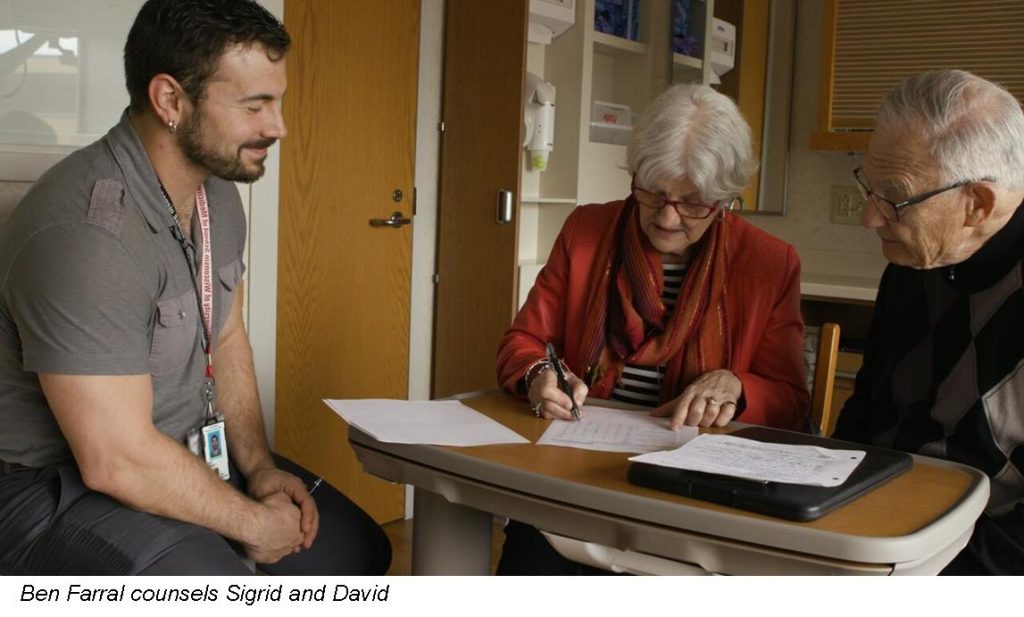Clinical trials are important for scientists to find cures for diseases. However many people who may be eligible to participate are held back by misconceptions and fears. The truth is that the greater number of people who participate in studies and trials, the faster a cure can be found.
The Alzheimer’s Association website lists nine myths people frequently associate with participating in an Alzheimer’s clinical trial. We spoke with Ben Farral, Coordinator of the Solanezumab Clinical Trial for Those with Preclinical Memory Complaints (A4) at the Wisconsin Alzheimer’s Disease Research Center. The A4 trial is testing the effectiveness of the drug Solanezumab on older individuals (ages 65-85) who may be at risk for memory loss due to Alzheimer’s disease, but have no outward signs of the disease. The study began in 2014 and needs more participants.
What are Farral’s responses to the myths?
Myth #1: There are already plenty of volunteers. They don’t need me to participate.
Farral: The A4 trial is seeking around 1150 participants worldwide and we’re currently in the 700s, so we need about 450 more.
Myth #2: It’s too late – the disease is too advanced to participate in a research study.
Farral: My study is a preventative study for those at risk but without current memory concerns. My participants, when they find out they are at risk, tend to become more motivated to participate because they know this trial is the closest thing to a cure in existence right now and, even if it ends up not working, it still helps to direct future research.
Myth #3: Clinical trials are dangerous because they use new and unproven methods and medications.
Farral: By the time an experimental medication reaches human trials, it has been tested quite extensively. Risks have been minimized and tend to be known. There can still be unknown risks, which is a part of clinical trials, but that can be said of any approved prescription med available today.
Myth #4: If I join a clinical trial, I won’t receive the same quality of care that I currently have with my doctor.
Farral: Most participants feel that they receive better care while on the study than they normally receive. Because of the number of exams, blood draws, and scans that are a part of the study, we have discovered conditions previously unknown that we then reported to participants and their primaries.
Myth #5. If I join a treatment clinical trial, I will get a placebo.
Farral: I understand the concerns of someone being told they’re at risk for developing Alzheimer’s and then receiving saline for three years while the disease possibly progresses. I have had a couple who chose not to screen for the study because of that. For those who do choose to screen despite expressing concern over receiving the placebo, I make sure to reassure them that the contribution of placebo group is as important as those receiving the medication. If they are still interested, I explain the reasoning behind the placebo group.
Myth #6: There may be painful or invasive procedures as part of the clinical trial.
Farral: Everything that can be done to minimize risk or pain is done, but some of these procedures are necessary. This is the reason lumbar puncture is optional in the study I coordinate. It is extremely useful if done, but some people would refuse to participate if it was required. We have a very experienced, competent, and caring team performing all study procedures and you can refuse participation at any time.
Myth #7: It costs too much to participate in a clinical trial.
Farral: We offer reimbursement for each study visit and can offer travel reimbursement on a case-by-case basis. There is no cost to you.
Myth #8: I am going to be rejected from a clinical trial because I have another disease or condition.
Farral: We do a formal phone screen and discuss current medical conditions prior to bringing anyone in for the study so their time is not wasted.
Myth #9: If there is a clinical trial that could help me, my doctor will tell me about it.
Farral: There are so many clinical trials available that doctors cannot keep up with them all. In addition, the PET scan we use to determine whether participants are at risk for Alzheimer’s is not clinically available. At this point, the only way a primary care provider would know that an Alzheimer’s trial could be beneficial for a patient would be for that patient to present with memory concerns. At that point, they may not qualify for a prevention trial like the A4 study.
THE BIG PICTURE
There are more than 100 clinical trials and studies taking place across the country for Alzheimer’s disease. On a national level, you can find Alzheimer’s clinical trials near you for which you would qualify by registering on the Alzheimer’s Association TrialMatch. The application takes less than 5 minutes to complete and asks for basic demographic information such as your age, race, diagnosed conditions, etc. Then you can view the studies for which you might qualify within five categories: treatment, diagnostic, prevention, quality of life, and online.
There are six trials for which the Wisconsin Alzheimer’s Disease Research Center is actively recruiting, including Farral’s A4 study. New studies start all the time; you can register with the Wisconsin ADRC with your information and they will contact you when a study begins for which you would be eligible.
This new year, let go of unhelpful myths and consider contributing to a world without Alzheimer’s disease.
–Jean Wentz, Production Assistant
